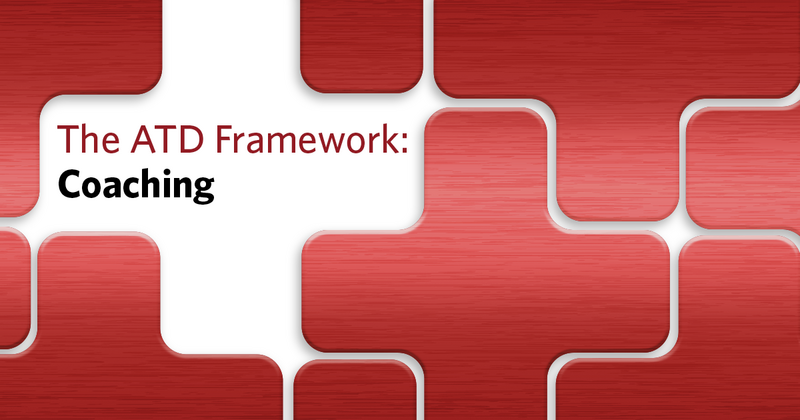ATD Blog
The ATD Talent Development Framework: Coaching
Thu Jul 28 2016

Content
Content
ATD developed the Talent Development Framework and the TD Puzzle to help practitioners understand the different components of talent development, and how organizations can build their own frameworks to address their unique needs. This blog series explores each component of the talent development framework, why it’s important to the field, and what resources ATD offers to practitioners who want to learn more.
ATD developed the Talent Development Framework and the TD Puzzle to help practitioners understand the different components of talent development, and how organizations can build their own frameworks to address their unique needs. This blog series explores each component of the talent development framework, why it’s important to the field, and what resources ATD offers to practitioners who want to learn more.
Content
Coaching
Coaching
Content
Coaching as a component of talent development is growing in popularity and acceptance. In the workplace, coaching may be done by a number of people, from a professional coach to a manager or a more experienced colleague. Coaching, when effective, results in improved performance.
Coaching as a component of talent development is growing in popularity and acceptance. In the workplace, coaching may be done by a number of people, from a professional coach to a manager or a more experienced colleague. Coaching, when effective, results in improved performance.
Content
According to the ATD Competency Study , coaching applies a systematic process to improve others’ ability to set goals, take action, and maximize strengths. According to Annabelle Reitman and Sylvia Ramirez Benatti, coaching is formally focused with somewhat narrow perspectives toward specific goals or results. While managers can certainly develop coaching skills, a professional coach’s job is to equip the person receiving coaching with tools to develop their performance and empower them to achieve specified results. It is a systematic process for continual improvement.
According to the ATD Competency Study, coaching applies a systematic process to improve others’ ability to set goals, take action, and maximize strengths. According to Annabelle Reitman and Sylvia Ramirez Benatti, coaching is formally focused with somewhat narrow perspectives toward specific goals or results. While managers can certainly develop coaching skills, a professional coach’s job is to equip the person receiving coaching with tools to develop their performance and empower them to achieve specified results. It is a systematic process for continual improvement.
Content
The ATD Competency Model identifies 11 coaching skills talent development professionals should possess:
The ATD Competency Model identifies 11 coaching skills talent development professionals should possess:
Content
• Establish coaching agreement.
• Establish coaching agreement.
Content
• Establish trust and intimacy with the client.
• Establish trust and intimacy with the client.
Content
• Display coaching presence.
• Display coaching presence.
Content
• Demonstrate active listening.
• Demonstrate active listening.
Content
• Ask powerful questions.
• Ask powerful questions.
Content
• Use direct communication.
• Use direct communication.
Content
• Create awareness.
• Create awareness.
Content
• Design learning opportunities.
• Design learning opportunities.
Content
• Develop goals and plans.
• Develop goals and plans.
Content
• Manage progress and accountability.
• Manage progress and accountability.
Content
• Meet ethical guidelines and professional standards.
• Meet ethical guidelines and professional standards.

Content
Coaching can completely revitalize a work environment. Using coaching techniques, measurable improvements can be observed within a company. The measurements—whether steps toward a goal or skills that have been improved on—are mile markers against which to measure upcoming successes. This is critical because the data reflect growth in value and skills. Employees who achieve goals they set and see improvement as a result of coaching stay motivated to continue improving performance. Coaching is a valuable process for talent development that can drive real value in organizations.
Coaching can completely revitalize a work environment. Using coaching techniques, measurable improvements can be observed within a company. The measurements—whether steps toward a goal or skills that have been improved on—are mile markers against which to measure upcoming successes. This is critical because the data reflect growth in value and skills. Employees who achieve goals they set and see improvement as a result of coaching stay motivated to continue improving performance. Coaching is a valuable process for talent development that can drive real value in organizations.
Content
We’ve assembled some additional coaching resources to explore:
We’ve assembled some additional coaching resources to explore:
Content
• Learn the difference between mentoring and coaching.
• Learn the difference between mentoring and coaching.
Content
• Try a new approach using questions as a coaching method.
• Try a new approach using questions as a coaching method.
Content
• Take a closer look into performance coaching in the workplace.
• Take a closer look into performance coaching in the workplace.
Content
• Improve your human capital by learning how to train and coach leadership teams .
• Improve your human capital by learning how to train and coach leadership teams.
Content
• See how coaching can lead to visible success for your company.
• See how coaching can lead to visible success for your company.
Content
• Listening more intently can help coaching efforts.
• Listening more intently can help coaching efforts.
Content
• Coaching Certificate
Content
• ASTD Handbook , 2nd Edition.
• ASTD Handbook, 2nd Edition.
Content
• ATD’s Best On Coaching by ATD Press
• ATD’s Best On Coaching by ATD Press
Content
• Coaching Training by Lisa Haneberg
• Coaching Training by Lisa Haneberg
Content
• Coaching Basics, 2nd Edition by Lisa Haneberg
• Coaching Basics, 2nd Edition by Lisa Haneberg
Content
• Measuring the Success of Coaching by Jack J. Phillips, Lisa Ann Edwards, and Patti P. Phillips
• Measuring the Success of Coaching by Jack J. Phillips, Lisa Ann Edwards, and Patti P. Phillips
Content
• The Coaching Approach: A Key Tool for Successful Managers by ATD Research
• The Coaching Approach: A Key Tool for Successful Managers by ATD Research
